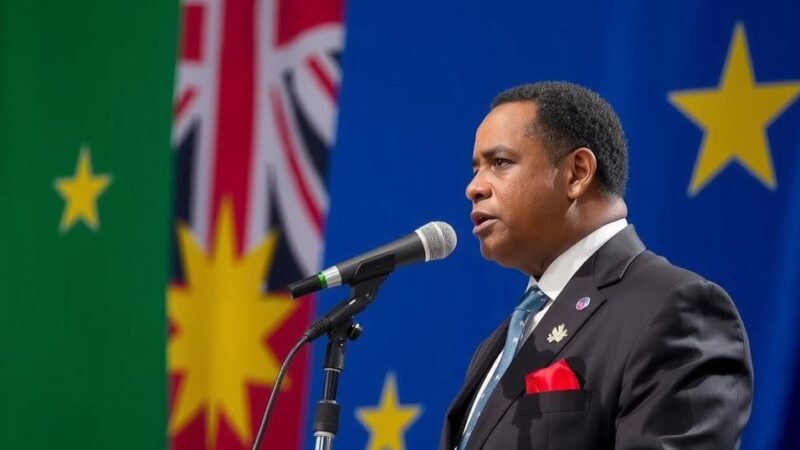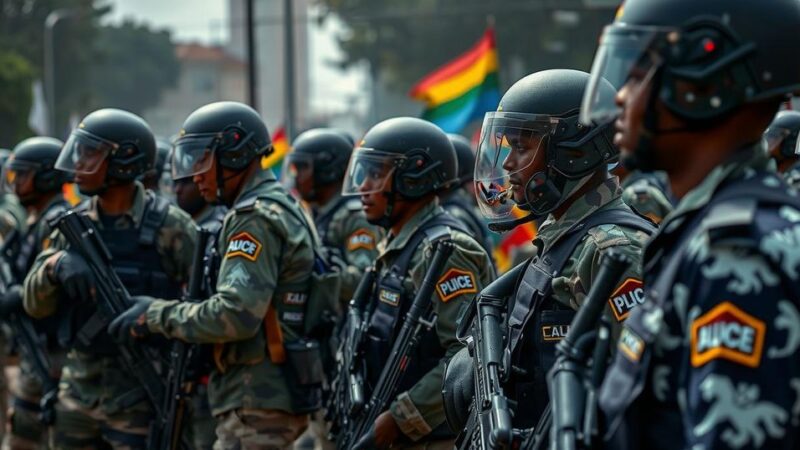Mlungisi Makhanya, the leader of Eswatini’s main opposition party, remains in critical condition after an alleged poisoning, seen by his allies as an assassination attempt. The government denies involvement, stating that Mr. Makhanya was not wanted and that accusations are unfounded. This incident follows previous acts of violence against political opponents, raising concerns about state-sanctioned aggression in Eswatini.
The leader of Eswatini’s principal opposition party, Mlungisi Makhanya, remains in a critical but stable condition following an alleged poisoning incident that his allies assert constitutes an assassination attempt. Mr. Makhanya was hospitalized in South Africa subsequent to the suspected poisoning that occurred on Tuesday at his residence in Pretoria, where he has been living in exile from Eswatini’s absolute monarchy. Penuel Malinga, the secretary general of the People’s United Democratic Movement (Pudemo), claimed, “This is a clear assassination attempt by the [Eswatini] state.” In response to these allegations, Alpheous Nxumalo, a spokesperson for the Eswatini government, firmly denied any involvement, asserting, “It is not in our policy as the government to either kill or poison people who hold a different political view in our country.” He further stated that Mr. Makhanya was not sought by authorities in Eswatini and labeled the accusations against the government as lacking evidence. Eswatini has been under the rule of King Mswati III since 1986, following the demise of his father. The king governs the nation by decree, and political party participation in elections is prohibited. At 56 years old, he is preparing to take his sixteenth wife and has faced significant criticism for his extravagant lifestyle in a country where a majority of the population lives in poverty. According to Mr. Malinga, Mr. Makhanya was given food that had been poisoned and was confined to his bedroom by an unnamed cook; rescuers were compelled to force the door open to aid him. Malinga mentioned that the police are currently conducting an investigation into the matter and indicated that physicians anticipate Mr. Makhanya’s recovery in approximately two weeks. A spokesman for the South African police has not yet commented on this situation. This incident follows the tragic murder of Thulani Maseko, a human rights attorney and Pudemo member, who was shot and killed at his home in Eswatini in front of his family last year. Although the government promised an investigation, no culprits have been held accountable to date. Mr. Makhanya previously condemned this assassination as politically motivated. Just prior to Maseko’s death, King Mswati remarked that activists were instigating violence, suggesting a lack of accountability regarding state-sanctioned aggression against dissidents. Additionally, at least 46 individuals lost their lives during security forces’ responses to pro-democracy protests in 2021, as reported by Human Rights Watch.
Eswatini, officially known as the Kingdom of Eswatini, is a landlocked nation in southern Africa, ruled by King Mswati III, who has maintained absolute monarchical power since 1986. The political landscape in Eswatini is marked by the prohibition of political parties from participating in elections, thereby establishing a system where dissent against the monarchy is often met with severe repercussions. The nation has a history of political unrest and human rights abuses, particularly against those advocating for democratic reforms. The recent poisoning incident involving opposition leader Mlungisi Makhanya has drawn attention to the alleged risks faced by political dissidents, highlighting the ongoing struggle for democracy in a nation grappling with oppressive rule. Makhanya’s condition comes on the heels of the assassination of Thulani Maseko, raising alarm over the escalation of violence against those opposing the regime.
In summary, the critical condition of Mlungisi Makhanya, following an alleged poisoning attempt, underscores the precarious situation for political opponents in Eswatini. The allegations of state involvement, coupled with the historical context of political repression in the kingdom, paint a troubling picture of dissent in the face of absolute monarchy. While the government disputes these claims, the continued violence and lack of accountability in cases such as Thulani Maseko’s murder reflect an ongoing crisis within Eswatini’s political sphere. There is a pressing need for transparency and justice to ensure the safety of individuals standing against the regime.
Original Source: www.theguardian.com






